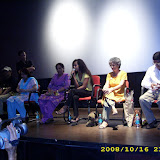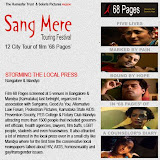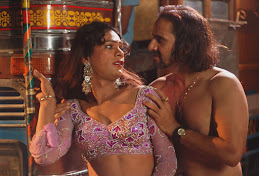by Paromita-Chakrabarti
Posted online: Friday , July 04, 2008 at 11:54:39
New Delhi, July 3
Director Sridhar Rangayan’s award-winning movie on HIV-affected gays finds no hall for screening
On June 29, as Delhi’s saw its first Rainbow Pride March, Sridhar Rangayan was busy trying to organise shows for his latest film, 68 Pages.
Like his previous two films, 68 Pages deals with issues close to Rangayan’s heart — lives of MSMs (men who have sex with men) who have been infected with HIV.
“But for all the hullabaloo about increased awareness about gays, educated urban heterosexuals are still scared to show empathy. There is no aggressive homophobia, but no support either,” shrugs the 45-year-old human rights activist.
Rangayan has reasons to believe so.
His film, which won the Silver Remi at the Houston World Fest earlier this year, is yet to be released in India as no mainstream distributor has come forward to screen it.
“When I made the film, I tried my best to stick to the narrative mode, so the audience could connect with it even if the subject was unfamiliar. But when I met the distributors, I realised it did not matter. They all refused to screen it on ground that a film on homosexuality which talks about AIDS, is not going to bring them any audience,” he says.
In Delhi alone, Rangayan had got in touch with all major multiplex owners, but the experience, he says, has left him rather sceptical.
“The PVR authorities did not respond for the longest time. Finally, when I sent them a rather curt mail, they replied that it did not quite fit even their corporate social responsibility profile.”
68 Pages deals with the lives of five HIV positive individuals — a trans-sexual bar dancer, a gay couple, a sex worker and a drug user — each grappling to come to terms with their own lives.
The story is a narrative from the personal diary of a counsellor who worked with them.
But instead of a bleak, oblique narrative, Rangayan has focussed on the idea of hope and redemption.
He drew his inspiration from the first woman counsellor who worked at his NGO, Humsafar Trust, in Mumbai, one of India’s first organisations to work with sexual minorities. Humsafar Trust is also the co-producer of the film.
The IIT Mumbai alumnus, who has worked with directors like Kalpana Lajmi, Sai Paranjape among others, is now distributing the film via the NGO route.
Humsafar Trust and their associates have come forward to hold a 12-city promotion tour, which includes Mumbai, Baroda, Nagpur, Indore, Chennai, Kolkata and Bangalore.
“We are going to show at auditoriums and hold discussion sessions afterwards, so there is a dialogue. That’s the only way to clear misconceptions,” he says.
In Delhi, Rangayan has found support in Gargi Sen’s Magic Lantern Foundation, an NGO which distributes non-commercial films.
A screening will be held on July 10 at the India International Centre. Naz Foundation, an NGO as well as Kriti, a city-based film club, too are organising screening. Rangayan is also planning to bring out DVDs of the movie.
All these, the director, says, are a small step towards their ultimate goal.
“It’s not just Article 377 which needs amendment. There’s still a long way to go before people’s mindset about alternative sexuality changes,” he says.























